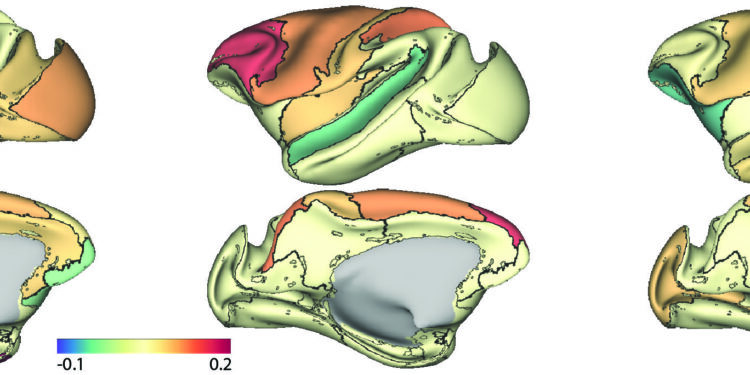Changes in volume (first column), cortical thickness (second column) and surface area (third column) during adolescent development. The color represents a proportional change from the earliest available time. Credit: Zhu et al.
Adolescence, the stage of life that marks the transition from childhood to adulthood, is known to be a vital period for brain development. During this critical phase, people’s mental abilities, including problem-solving and memory skills, improve rapidly.
Previous neuroscience studies have attempted to link these cognitive improvements observed during adolescence to changes in brain structure and connections between different brain regions. However, the relationship between changes in the brain and specific aspects of cognitive performance has not been fully elucidated.
Researchers from Vanderbilt University, CNRS Université de Lyon and the Wake Forest School of Medicine recently conducted a study on monkeys aimed at shedding new light on the foundations of mental maturation during adolescence. Their findings, published in Natural neurosciencesuggest that cognitive development in adolescent monkeys is associated with refined connectivity between brain regions, while changes in gray matter structure play a lesser role.
“It is well known that the prefrontal cortex, the part of the brain most responsible for higher cognitive functions, matures more slowly than other areas of the brain,” Christos Constantinidis, lead author of the paper, told Medical Xpress.
“Parents of adolescents blame the immature prefrontal cortex for poor life choices and impulsive decisions. Much less is known about how the activity of neurons in the prefrontal cortex changes as a function of the effect of this cognitive maturation. Our study was designed to trace changes in neuronal activity and identify the structural changes in the brain that are responsible for them.”
Exploring the mental changes that occur during adolescence
As part of their study, the researchers studied juvenile monkeys for several years, periodically collecting recordings of their brains and testing their cognitive abilities. To assess their cognitive abilities, they used versions of tasks widely used to test children’s mental abilities.
Map of volume changes in the brain during adolescent development. Credit: Zhu et al.
“We tested monkeys with behavioral tasks measuring working memory and the ability to resist distraction,” Constantinidis explained.
“We relied on magnetic resonance imaging (MRI) methods to determine how the thickness and volume of the cerebral cortex and the myelination of the white matter that connects different areas change with age. Additionally, we were able to directly monitor the activity of neurons in the prefrontal cortex with microelectrode recordings.”
Notably, most monkey species age 3 times faster than humans and their adolescence lasts about 2 to 3 years. Constantinidis and his colleagues followed the development of young monkeys throughout this period, using both experimental tasks and MRI imaging.
New insight into brain and mind development
When they analyzed the recorded data, the researchers found that the cognitive performance and firing rate of the monkeys’ neurons were best predicted by the maturation of the white matter connecting the frontal lobe to other areas of the brain. This suggests that connectivity between brain regions known to support mental functions plays a key role in the improvement in mental skills observed in adolescence.
“Cortical thickness, known to decrease during development as used synapses are pruned, was less predictive of cognitive maturation,” Constantinidis said. “Our results begin to link structural changes in the brain, which are more easily detectable with imaging methods in humans, to changes in neuron activity, which are more difficult to assess.”
This recent study suggests that white matter growth in primate brains is a signature of healthy brain maturation. In the future, Constantinidis and his colleagues plan to expand their research to include other brain areas beyond the prefrontal cortex.
“In these experiments, it was only possible to monitor neuronal activity in the prefrontal cortex,” he added. “We plan to expand our approach to discover how neuronal activity matures in the brain.
“So far, we have only used a few working memory-based tasks, but we would also like to expand the range of cognitive tasks we use and determine which areas of the brain are responsible for performing more complex cognitive functions as development progresses. In parallel, we aim to refine our techniques and reveal how activity patterns emerge across layers of the cerebral cortex.”
Written for you by our author Ingrid Fadelli, edited by Gaby Clark, and fact-checked and revised by Robert Egan, this article is the result of painstaking human work. We rely on readers like you to keep independent science journalism alive. If this reporting interests you, consider making a donation (especially monthly). You will get a without advertising account as a thank you.
More information:
Junda Zhu et al, Longitudinal measures of monkey brain structure and activity through adolescence predict cognitive maturation, Natural neuroscience (2025). DOI: 10.1038/s41593-025-02076-0.
© 2025 Science X Network
Quote: White matter connections may lead to cognitive gains in adolescents, study suggests (November 10, 2025) retrieved November 10, 2025 from
This document is subject to copyright. Except for fair use for private study or research purposes, no part may be reproduced without written permission. The content is provided for informational purposes only.


